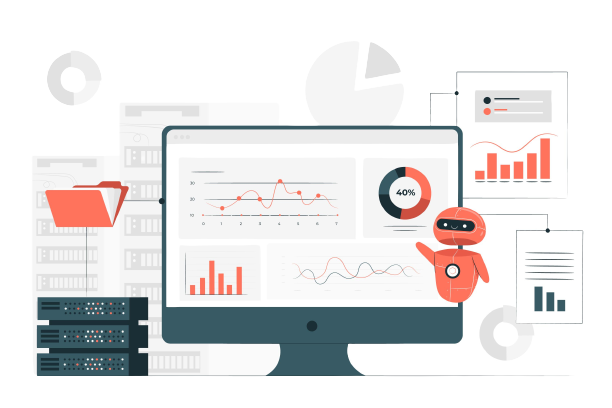
CRM is a strategy and set of technologies designed to help businesses manage and analyze their interactions with customers and potential customers. CRM stands for Customer Relationship Management, an approach that helps businesses build and maintain strong customer relationships. It’s not just about managing contact information and communication history; it’s a comprehensive system that includes tools and processes for tracking and analyzing every interaction with customers. This can encompass email correspondence, phone calls, social media interactions, and face-to-face meetings. CRM software provides a central hub for organizing and making sense of this data.
Like any other enterprise, small businesses have customers at the core of their operations. CRM for small businesses allows them to keep detailed records of their interactions, which can be invaluable for improving customer service, increasing sales, and making data-driven decisions.
Small businesses can use CRM to:
- Streamline Communication: CRM systems provide a centralized platform where all customer information and communication history is stored. This makes it easier for small businesses to communicate with customers effectively and provide timely responses to inquiries.
- Personalize Customer Interactions: CRM allows businesses to collect and analyze customer data, enabling them to tailor their marketing and customer service efforts to individual preferences and needs.
- Enhance Customer Service: Quick access to customer information and past interactions helps small businesses provide better customer support. This leads to increased customer satisfaction and loyalty.
- Improve Sales and Marketing: CRM systems enable small businesses to track leads, opportunities, and sales activities. This helps in targeting the right customers with the right products or services, leading to increased revenue.
- Make Informed Business Decisions: The data and insights generated by CRM systems can be used for strategic planning and forecasting. Small businesses can identify trends and adjust their strategies accordingly.
The Significance of CRM for Small Businesses

CRM holds immense significance for small businesses, often more so than for larger enterprises. Small businesses often have limited resources and need to make every interaction count. CRM offers them the means to do just that. Here are some key points highlighting the significance of CRM for small businesses:
- Competing with Larger Players: Small businesses often need to compete with larger companies. CRM levels the playing field by allowing them to provide personalized, attentive customer service that larger corporations may struggle to match.
- Customer Retention: Acquiring new customers can be expensive while retaining existing ones is often more cost-effective. CRM helps small businesses build and maintain strong customer relationships, increasing customer loyalty and reducing churn.
- Efficiency and Productivity: Small businesses need to do more with less. CRM automates many manual tasks, freeing up time and resources that can be reinvested into other critical areas of the business.
- Data-Driven Decisions: Data is a valuable asset, and small businesses can use the insights from CRM systems to make informed decisions, optimize processes, and grow strategically.
The Role of Automation in Small Business Growth

Automation is a central component of CRM that can be a game-changer for small businesses. It involves the automatic execution of tasks, processes, and workflows within the CRM system. Here’s how automation plays a pivotal role in the growth of small businesses:
- Efficiency and Time Savings: Automation streamlines routine tasks, such as data entry, lead nurturing, and follow-up emails. This frees up employees to focus on more strategic and value-added activities.
- Consistency: Automated processes ensure that every customer interaction is handled consistently and according to predefined standards. This consistency is vital for building a professional and reliable brand image.
- Scalability: As small businesses grow, automation can easily adapt to increased workloads and customer volumes without the need for significant additional resources.
- Personalization at Scale: Automation allows small businesses to personalize customer interactions, even as their customer base expands. Tailoring marketing campaigns and outreach becomes more manageable.
- Data Accuracy: Automated data entry and validation processes reduce the risk of human errors, ensuring that the information in the CRM system is accurate and up-to-date.
Thus, it can be said that CRM is a powerful tool for small businesses, offering them a means to efficiently manage customer relationships, improve customer service, and drive growth. Automation within CRM systems takes these advantages to the next level, allowing small businesses to compete effectively, save time, and deliver personalized experiences at scale. It’s a combination that can significantly empower small businesses.
Benefits of CRM and Automation

Small businesses are constantly seeking ways to enhance their operations, gain a competitive edge, and provide exceptional customer experiences. This is where CRM software and automation play a pivotal role. Let’s explore the key benefits of CRM and automation for small businesses:
- Streamlining Customer Data Management
Small businesses often struggle with disorganized customer data. Contact information, purchase history, communication logs, and other critical details can be scattered across various platforms and spreadsheets, making it difficult to access and use this data effectively.
Implementing a CRM system streamlines customer data management in several ways:
- Centralized Data: CRM software acts as a centralized repository for all customer-related information. It organizes data in a structured manner, making it easily accessible to authorized team members.
- Data Consistency: With CRM, you can ensure data consistency by eliminating duplicates and errors. This ensures that you’re working with accurate and up-to-date information.
- Data Security: CRM systems typically provide robust security features to protect sensitive customer data, reducing the risk of data breaches and non-compliance with data protection regulations.
- Data Analytics: CRM systems often come with built-in analytics tools that allow you to gain valuable insights from customer data, helping you make informed decisions and personalized marketing strategies.
- Efficient Data Retrieval: Team members can quickly retrieve customer information, enabling them to provide better customer service and engage in more personalized interactions.
Overall, streamlining customer data management through CRM and automation not only saves time and reduces errors but also empowers businesses to make data-driven decisions and deliver more personalized services.
- Improved Communication and Collaboration
Effective communication and collaboration are vital for the success of any small business. CRM and automation tools facilitate these aspects in the following ways:
- Centralized Communication: CRM systems often include communication tracking features that capture interactions with customers, be it through email, phone calls, or chat. This ensures that all team members have access to the latest customer interactions, leading to more cohesive and informed communication.
- Task Automation: Automation can be applied to routine communication tasks, such as sending follow-up emails or reminders. This frees up your team’s time to focus on more strategic tasks.
- Collaboration Tools: Many CRM systems incorporate collaboration features that enable team members to work together seamlessly, whether in the same office or remotely.
- Notification Systems: Automation can be used to trigger notifications for important events or activities, ensuring that team members stay informed and responsive.
Improved communication and collaboration lead to more effective teamwork, reduced miscommunication, and enhanced customer engagement. This, in turn, contributes to greater customer satisfaction and loyalty.
- Enhancing Customer Service and Satisfaction
Customer service is the backbone of any successful business. CRM and automation can significantly enhance the quality of customer service and satisfaction through:
- Quick Response Times: Automation tools can prioritize and route customer inquiries, ensuring that they reach the right team member promptly.
- Personalized Interactions: CRM systems store customer data, enabling businesses to provide personalized service, address customer needs, and make relevant product recommendations.
- Follow-up Automation: CRM and automation can automate follow-up messages or customer surveys, helping you gather feedback and address issues promptly.
- Data-Driven Decision-Making: CRM systems provide valuable insights that allow businesses to proactively identify and resolve customer issues, leading to higher satisfaction levels.
- Consistent Service: CRM and automation tools ensure that customers receive consistent service, irrespective of the team members they interact with, which builds trust and reliability.
Small businesses that embrace these technologies gain a competitive edge and create a more satisfying experience for their customers, ultimately driving growth and success.
Automation in CRM

Automation plays a pivotal role in enhancing efficiency, reducing manual tasks, and streamlining processes. CRM systems have evolved to incorporate automation as a core feature, and this has had a profound impact on the way businesses interact with their customers and manage their operations.
Understanding Automation within CRM
Automation within CRM refers to the use of technology to perform repetitive and time-consuming tasks without manual intervention. It aims to simplify processes, reduce the margin of error, and enable businesses to allocate their resources more efficiently. Here’s a deeper look into the key elements of automation within CRM:
- Data Entry and Management: CRM systems can automatically capture and update customer information, saving time and ensuring data accuracy. This is especially important for small businesses that may not have the resources for dedicated data entry personnel.
- Lead Qualification: Automation can score and qualify leads based on predefined criteria, ensuring that your sales team focuses their efforts on leads with the highest potential. This reduces wasted time and boosts conversion rates.
- Email Marketing: CRM automation enables businesses to send targeted and personalized emails to customers at the right time. This can include welcome emails, follow-up messages, and post-purchase communications, all of which can be scheduled and triggered automatically.
- Task and Workflow Automation: Routine tasks, such as assigning follow-ups or setting reminders, can be automated. Workflows can also be designed to automatically move leads or opportunities through various stages based on their behavior or interactions with your business.
- Reporting and Analytics: Automation can generate real-time reports and dashboards, providing insights into customer behavior, sales performance, and marketing effectiveness. This data-driven decision-making is crucial for small businesses seeking to optimize their strategies.
Types of Business Processes That Can Be Automated
Automation within CRM is versatile and can be applied to various business processes. Here are some common processes that can benefit from automation:
- Sales Process: Automating lead scoring, follow-ups, and contact management can significantly increase the efficiency of your sales team.
- Marketing Campaigns: Automated email marketing, lead nurturing, and segmentation can enhance the effectiveness of your marketing efforts.
- Customer Support: Automation can route customer inquiries to the right support personnel and track resolution times, leading to improved customer satisfaction.
- Inventory and Order Management: Small businesses involved in retail or e-commerce can automate inventory tracking, order processing, and even reorder notifications.
- Appointment Scheduling: For service-based businesses, appointment scheduling, and reminders can be automated to reduce no-shows and improve customer satisfaction.
- Data Entry and Management: Automating data entry not only saves time but also ensures data accuracy, which is critical for decision-making.
There are so many other tasks that can be automated using CRM like communication, invoicing, etc. There are a few CRMs that also automate sales pipelines and deals, landing page and forms building, email marketing, and other important aspects of business.
The Impact of Automation on Efficiency
The integration of automation within CRM has a profound impact on the efficiency and productivity of small businesses:
- Time Savings: Automation reduces the time spent on manual and repetitive tasks, allowing employees to focus on more value-added activities, such as building relationships with customers.
- Reduced Errors: Automation minimizes the risk of human error, ensuring that data is accurately captured, leads are properly managed, and processes are executed consistently.
- Scalability: Small businesses can grow without the need for a linear increase in human resources, as automation can handle larger workloads efficiently.
- Improved Customer Experience: Automation allows businesses to provide more personalized and timely interactions with customers, leading to higher satisfaction and retention rates.
- Data-Driven Decision Making: Real-time analytics and reporting made possible by automation enable businesses to make data-driven decisions that can positively impact their bottom line.
The automation of processes within CRM empowers small businesses by increasing operational efficiency, reducing manual labor, and improving customer interactions. It’s a critical tool in today’s business environment, enabling small enterprises to compete effectively in the market.
Best Practices in Small Business Automation

Small businesses can maximize the benefits of CRM by implementing best practices in automation. Let’s explore some key strategies that help small businesses make the most of their CRM systems.
- Managing CRM Data Securely
Effective data management is essential for the success of any CRM system. Here are some best practices for securely managing your CRM data:
- Data Encryption: Ensure that your CRM system uses strong encryption methods to protect sensitive customer information. Data should be encrypted both during transmission and while stored on servers.
- Access Control: Implement stringent access controls to limit who can view, edit, or delete CRM data. Regularly review and update user access permissions to align with job roles and responsibilities.
- Regular Backups: Set up automated, regular backups of your CRM data. This ensures that in the event of data loss or system failures, you can quickly recover and minimize downtime.
- Security Audits: Conduct regular security audits and penetration testing to identify vulnerabilities and address them promptly.
- Training and Awareness: Train your employees on data security best practices and create awareness about the importance of protecting customer data.
By following these data security best practices, your small business can maintain the trust of your customers and safeguard their information.
- Optimizing User Experience for On-the-Go Access
In today’s business environment, remote access to CRM systems is crucial for small businesses that need to be agile and responsive. To optimize the user experience for on-the-go access, consider the following:
- Mobile-Responsive Design: Ensure your CRM system is mobile-responsive, so it adapts to various screen sizes and devices. This allows your team to access CRM data seamlessly on smartphones and tablets.
- Cloud-Based Solutions: Consider using cloud-based CRM solutions that offer the flexibility of accessing data from any location with an internet connection. Cloud systems often provide a consistent user experience across devices.
- Offline Access: Choose a CRM system that allows for offline access and data synchronization. This is valuable when your team is in areas with limited or no internet connectivity.
- Intuitive User Interfaces: Prioritize CRM systems with user-friendly interfaces. The easier it is to navigate, the quicker your team can access and update important customer information.
By optimizing the user experience for on-the-go access, your small business can empower your team to work efficiently and respond promptly to customer needs, regardless of their physical location.
- Staying Updated with CRM Trends
The CRM landscape is continuously evolving with new technologies and trends. Staying informed about these developments can give your small business a competitive edge. Here’s how to stay updated with CRM trends:
- Attend Conferences and Webinars: Participate in CRM-related conferences, webinars, and workshops to learn about the latest industry trends and emerging technologies.
- Network with Experts: Connect with CRM experts and professionals in your industry. They can provide insights into what’s working for them and share their experiences.
- Subscribe to Industry Publications: Subscribe to CRM and small business-related magazines, blogs, and newsletters. These resources often provide valuable insights and case studies.
- Engage in Online Communities: Join online CRM communities and forums to exchange ideas and knowledge with peers. These platforms can be a valuable source of information and support.
- Continuous Training: Provide ongoing training for your team to keep them updated on CRM trends and best practices. Many CRM software providers offer regular updates and training materials.
By staying current with CRM trends, your small business can take advantage of new features and strategies to improve your customer relationships and enhance your automation efforts. Small businesses that leverage CRM systems effectively are better equipped to thrive in an increasingly digital and automated business landscape.
The Future of Small Business Automation

As technology continues to advance at a rapid pace, the landscape of small business automation is evolving. To ensure that your small business remains competitive and efficient in the years to come, it’s essential to keep an eye on emerging trends and take proactive steps.
Emerging Trends in CRM and Automation
- AI and Machine Learning Integration: The integration of Artificial Intelligence (AI) and machine learning into CRM systems is set to become even more prominent. These technologies will help small businesses better analyze customer data, make data-driven decisions, and automate tasks such as personalized marketing and customer support.
- IoT and Smart Devices: The Internet of Things (IoT) and smart devices are revolutionizing how businesses collect data. In the future, small businesses can harness IoT to gain real-time insights into customer behavior and product usage, improving product development and customer service.
- Enhanced Customer Engagement: CRM systems will focus on enhancing customer engagement by leveraging data to provide highly personalized experiences. Chatbots, virtual assistants, and predictive analytics will play a crucial role in this trend, offering customers the convenience of quick and accurate support.
- Blockchain for Security and Transparency: Small businesses will increasingly adopt blockchain technology for enhancing data security and transparency. Blockchain can be used to securely store and manage customer data, transactions, and supply chain information.
- Cloud-Based and Mobile Solutions: The future of CRM and automation for small businesses will be heavily cloud-based and mobile-oriented. This enables remote work and real-time access to customer data, making it easier for businesses to operate from anywhere.
Predictions for the Future of Small Business Empowerment
- Hyper-Personalization: Small businesses will be able to hyper-personalize their marketing, sales, and support efforts, creating stronger and more loyal customer relationships.
- Efficiency and Cost Reduction: Automation will continue to drive efficiency and reduce operational costs, allowing small businesses to compete with larger counterparts.
- Competitive Advantage: Those embracing the latest automation trends will have a significant competitive advantage, as customers increasingly expect seamless and personalized experiences.
- Global Reach: Automation will enable small businesses to expand their reach to international markets more easily, breaking down geographical barriers.
Embracing these changes and opportunities will enable your business to thrive in the digital age.
Conclusion: Summarizing the Empowering Aspects of CRM and Automation for Small Businesses
Here are some key takeaways of how CRM empowers small businesses and why embracing automation is not just a choice but a necessity.
- Streamlining Business Operations: One of the most significant benefits of CRM and automation for small businesses is the ability to streamline various aspects of daily operations. By centralizing customer data, managing leads and opportunities, and automating repetitive tasks like email responses, small businesses can significantly increase their efficiency. This efficiency translates into more time for strategic decision-making and customer engagement.
- Improved Customer Relationships: A strong and lasting relationship with customers is the backbone of any small business. CRM systems help small businesses manage customer interactions effectively. By keeping track of customer preferences, purchase history, and feedback, businesses can offer more personalized services. Automation ensures that no customer query or request goes unnoticed, contributing to increased customer satisfaction.
- Enhanced Communication and Collaboration: CRM platforms facilitate internal communication and collaboration. Team members can access real-time customer data, which is especially important in remote or on-the-go scenarios. This feature allows employees to provide consistent and coherent customer experiences, regardless of where they are located. Collaboration tools within CRM systems also improve teamwork and project management.
- Data-Driven Decision Making: The data generated and managed through CRM systems provide invaluable insights. Small businesses can analyze customer behaviors, sales trends, and other key metrics to make informed decisions. This data-driven approach helps in targeting the right market segments, optimizing marketing campaigns, and adapting strategies to changing market conditions.
- Encouraging Small Business Owners to Embrace Automation: Embracing automation might seem like a daunting task, but it’s a step that small business owners cannot afford to overlook. Automation not only reduces the burden of repetitive and time-consuming tasks but also ensures accuracy and consistency in business processes. This efficiency leads to cost savings and better resource allocation.
- Maximizing Customer Satisfaction: By automating processes such as lead nurturing, email marketing, and customer support, small businesses can provide quicker responses and more personalized interactions. This level of service not only keeps existing customers happy but also attracts new ones through positive word-of-mouth.
- Competing with Larger Enterprises: Small businesses often compete with larger enterprises in the same market. CRM and automation level the playing field. Small businesses can provide the same level of service and engagement as larger competitors, giving them a competitive advantage.
CRM marketing automation offers small businesses an incredible opportunity to thrive and grow in an ever-evolving business world. Embracing automation is no longer a choice; it’s a strategic imperative for small businesses looking to stay competitive and continue their growth journey. So, if you’re a small business owner, now is the time to harness the power of CRM and automation to empower your business and reach new heights.